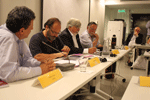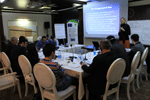Social Watch news
Published on Thu, 2014-03-27 18:27
For the last quarter of the twentieth century, Latin America suffered from low growth, rising inequality, and frequent financial crises, i.e. currency, sovereign debt and banking crises. For instance, between the early 1980s and 2002 there were at least 26 major banking crises involving 15 countries. Sovereign debt defaults and currency crises were frequent, as were ‘double’ or ‘triple’ financial crises (as in the case of the Tequila crisis of 1994, Ecuadorian crisis of 1999, and Argentinean default of 2001-2). The cost of such crises was massive, as during the three years subsequent to their outbreak the cumulative output losses reached up to 98 per cent of GDP. During this period, the high income inequality that afflicted Latin America for centuries rose further – from a Gini of 48.9 in early 1980s to 54.1 in 2002 (See Figure 1) – including because of the impact of devastating financial crises on growth, employment, relative prices and public subsidies.
|
Published on Fri, 2014-03-21 09:02
Developing countries voice various concerns and priorities on differentiation, means of implementation, global partnership and a narrative in the 9th session of the Open Working Group on Sustainable Development Goals
The first of five intergovernmental consultation sessions in the second phase of the United Nations Open Working Group (OWG) on Sustainable Development Goals (SDGs) took place on 3-5 March in New York. The eight OWG sessions thus far constituted the “input” phase. They took place over the course of one year, from March 2013 to February 2014.
The OWG is a key process for the follow-up of the outcome of the UN Conference on Sustainable Development in 2012 (Rio+20). The Co-chairs of the OWG are Ambassadors Macharia Kamau of Kenya and Csaba Korosi of Hungary.
|
Published on Fri, 2014-03-21 08:57
The basic parameters of the future development agenda were laid out at the autumn session of the UN General Assembly. The roadmap was presented and initial answers given as to where the global journey should be taking us from 2015 on. The train to genuine sustainability could soon jump the tracks.
At its core, the Post-2015 Agenda will interlink sustainability and the fight against poverty and hunger in a single framework binding on all countries. Compared to the Millennium Development Goals (MDGs), the Sustainable Development Goals (SDGs) shall now also guarantee peace and security, a democratic say, the rule of law, equal rights as well as human rights. So far, so good.
|
Published on Fri, 2014-03-21 08:47
With the outbreak of the “Arab Springs” the IMF rushed to Middle East and North Africa’s transitional governments to provide loans conditional upon the implementation of a fiscal consolidation approach to economic crisis.
These programs were accompanied by austerity measures contrary to the aspirations of the Arab populations for social justice, causing political instability. The Egyptian Center for Economic and Social Rights (ECESR), The Arab NGO Network for Development (ANND) and New America Foundation (NAF) Middle East Task Force, recently conducted a study of IMF recommendations to Arab governments.
|
Published on Fri, 2014-03-14 09:30

Uruguayan ministers in the
Social Watch meeting.
Photo: Wolfgang Obenland.
|
A meeting aimed at coordinating global advocacy on a new development agenda was held last February 23-24 in Istanbul, convened by the UN Secretary-General’s adviser on development planning, the UN Foundation, the Overseas Development Institute of the UK and CIVICUS. Social Watch addressed a letter to the meeting arguing that "joint civil society action around Post-2015 has to focus on goals and commitments for the countries of the North, the necessary changes of the consumption and production patterns in these countries, and the structural framework conditions shaped by these countries, particularly in the global financial, investment and trade systems".
|
Published on Thu, 2014-03-13 14:08
About two dozen Iraqi women have demonstrated in Baghdad against a draft law approved by the Iraqi cabinet that would permit the marriage of nine-year-old girls and automatically give child custody to fathers.
The group's protest was on International Women's Day on Saturday (local time) and a week after the cabinet voted for the legislation, based on Shiite Islamic jurisprudence, allowing clergy to preside over marriages, divorces and inheritances.
|
Published on Thu, 2014-03-13 10:27
The training on Gender-Responsive Budgeting, Budget Analysis and Policy Advocacy was organized for experts of National Budget Group (NBG) in Baku last February under the project: “Your Money, Your Future: Improving Public Finance Policy and Management in Azerbaijan”. The purpose of the training was to increase the awareness and knowledge of civil society experts about the public finance policy analysis and writing capacity, policy advocacy, gender-responsive budgeting and provide them with relevant information on the concept, tools and practices.
|
Published on Thu, 2014-03-13 09:52
Despite commitments to enhance coherence of development, financial, monetary, trade, investment and other key policies, global economic policymaking remains fragmented and incoherent. “Coherence among the various areas of international policymaking is critical to ensuring that actions in one policy area do not undermine the goals or actions in another,” said a report released by the UN Independent Expert on Foreign Debt and Human Rights, Mr. Cephas Lumina (“the Independent Expert”) and prepared for the General Assembly.
|
Published on Fri, 2014-03-07 07:17

Uruguayan president José Mujica.
|
Uruguayan president José Mujica meets with international civil society during a "strategy meeting" organized by Social Watch and demand action from the powerful governments of the world. February 2014, Montevideo.
|
SUSCRIBE TO OUR NEWSLETTER
Submit

|









